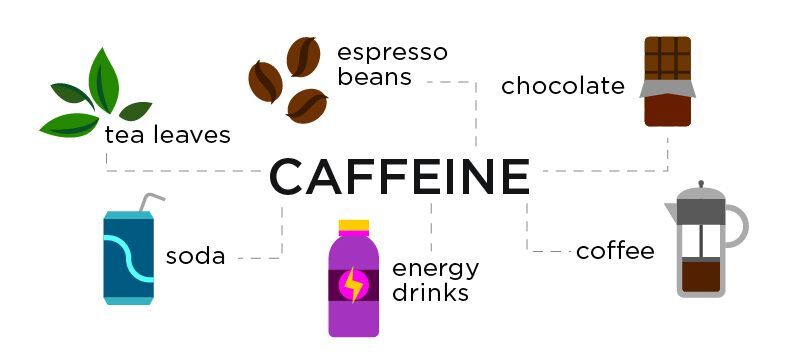All You Need To Know About Caffeine
Jul 05, 2019 • 29 views
The word “caffeine” comes from German word kaffee and French word café, each meaning coffee. It is mostly found in natural stimulants like cacao plants, coffee and tea. When caffeine is purified, it produces a bitter white powder that provides a distinctive taste in soft drinks. It is most widely used psychoactive substance. Products that have caffeine are tea, coffee and some soft drinks. Soft drinks came in market in late 1800s and then later energy drinks followed it too. Coffee was discovered after tea. Tea was discovered in2737 BC whereas coffee, many years later that. Caffeine works approximately 20-30 minutes after its consumption and its effect persists for about 3 hours. Intake of caffeine makes us feel more alert, awake, and focused but too much of anything can cause negative effects to health. It stimulates the central nervous system by increasing the release of neurotransmitters like noradreline, dopamine and serotonin.

FACTS ABOUT CAFFEINE
Caffeine is mostly said to be addictive, whereas it is observed that people can reduce the consumption of caffeine gradually. They might experience symptoms like headache, fatigue or drowsiness but it usually lasts for 2-3 days.
Caffeine does NOT increase the risk of cardiovascular diseases or raise cholesterol. It might sometimes lead to temporary increase in blood pressure.
The myth that caffeine causes cancer is proven false scientifically.
Caffeine is found in more than 60 plants including coffee, tealeaves, kola nuts, cocoa beans, etc.
Finland has highest coffee consumption rate, with average of 400mg day by average adult.
It may lower the risk of skin cancer, oral cancer and colon cancer.
Energy drinks have less caffeine content.
Work of caffeine is blocking the neurotransmitter that tells your brain that it is tired.
Caffeine stimulates the central nervous system, which mat increase metabolism and fat burning. But the effect is likely to remain small over the long term.
EFFECTS OF CAFFEINE
The most infamous effect of caffeine is that it delays fatigue temporarily and also sometimes causes insomnia but there are other worse effects also:
Discontinuation of regular caffeine might cause withdrawal symptoms like headaches, tremors, anxiety, low mood or fatigue.
Some people are more sensitive to caffeine than others. For them too much intake can cause irritability, nervousness, rapid heart rate, headaches and sometimes trouble in sleeping.
Drinking moderate amount of caffeine has proven to reduce the risk of suicide. However, excessive consumption can cause anxiety.
Although caffeine improves alertness but it has many negative side effects that includes restlessness, nervousness, insomnia, muscle twitching, etc.
Mayo clinic partnered study has found that more than 4 cups of caffeine consumption is linked to early death.
Women who drink more than moderate caffeine are prone to developing fibrocystic breast disease.
When caffeine is consumed empty stomach it causes indigestion or empty stomach.
Consumption of high doses of caffeine reduces fertility in women and also increases the chances of miscarriage.
Caffeine also has other health benefits like it lowers the risk of skin cancer, gout, multiple sclerosis (MS), liver cancer and colorectal cancer.
If you are already taking medicines then you should not combine it with caffeine. Medicines like ephedrine, theophylline and Echinacea may cause unpleasant effects if consumed with caffeine.
CAFFEINE INTAKE
130mg-300mg per day is considered low to moderate intake
200mg-300mg per day is moderate
400mg and above per day is high dosage
Heavy caffeine consumption is more than 6,000 mg/day.
CONCLUSION
Scientific evidences proves that caffeine is not as harmful as it was once believes to be. If consumed in proper amount it proves to give many healthy benefits as well like- makes working out easier, helps in control of pain, improves memory, heart benefits (if consumed moderately), etc.
